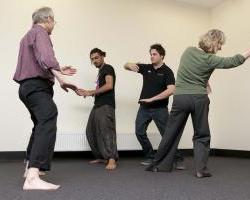After participating in a Tai Chi program, offered through Boston University Medical Center, veterans with post-traumatic stress disorder (PTSD) reported improved self-management of symptoms, including intrusive thoughts, poor concentration, and hyper-vigilance.
The lifetime risk of developing PTSD is 23.1 percent among veterans, and 8.7 percent in the general population. Symptoms tend to be chronic and are associated with a host of financial, physical, and psychological difficulties.
The ancient Chinese practice of Tai Chi involves a series of slow and graceful movements performed in a mindful manner. Each movement flows smoothly into the next without pause, and can be modified to accommodate people with mobility issues. Though a gentle form of exercise, it increases flexibility, balance, muscle strength, and cultivates a habit of mental tranquility.
In the Boston program, 17 veterans enrolled in a four-session introductory Tai Chi training. Following the last session, nearly 94 percent were very or mostly satisfied with the experience, and all participants reported a willingness to enroll in future Tai Chi programs. The veterans also described feeling “very engaged” during the sessions, and discovered that Tai Chi helped with PTSD symptom management.
These findings, published in the journal BMJ Open, are the first to look at the feasibility, and qualitative outcomes of Tai Chi practice for veterans with PTSD.
“Our findings also indicate that Tai chi is a safe physical activity and suitable for individuals with varying physical capabilities. Given our positive findings, additional research is needed to empirically evaluate Tai Chi as a treatment for symptoms of PTSD,” said Barbara Niles, Ph.D., assistant professor at Boston University School of Medicine, and research psychologist at the National Center for PTSD - Behavioral Science Division, VA Boston Healthcare System.
Source: Science Daily
Photo credit: UNE Photos



